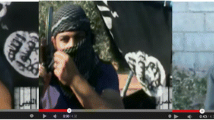Abstract
This article uses accounts of the different ‘Facebook Revolutions’ of 2011–2012 (the Arab Spring, European Anti-Austerity protests, Occupy) to speak to a broader narrative in contemporary culture: the cyber-utopian belief in social media as a fast track to political change. To critique this narrative, the article turns to the work of Machiavelli (specifically the vision of temporality expressed in his concept of fortuna). Machiavelli’s nuanced theory of politics, with its attentiveness to both slow-moving community-building, as well as audacious, fast-moving action, makes him ideal for thinking through transnational activism in a globalized and accelerating world. Such a framework can help us think critically about social media, avoiding the pitfalls of cyber-utopianism, while embracing opportunities that information technologies might provide us with. It also reorients our thinking about Machiavelli, rescuing him from his caricature as a ‘thinker of speed’, instead highlighting his attentiveness to the multiple temporalities of political life.
Similar content being viewed by others
Notes
Though note this is not the same as claiming that social media ‘caused’ the Egyptian revolution, or even more strongly, that social media necessarily leads to a more open society (see Khondker, 2011; Castells, 2012; Hussein and Howard, 2011, 2012).
For a description of Machiavelli’s republican ethos, see Viroli (1990) and Bernard (2008).
See Deudney’s (2007) work on what he terms the ‘Iron Law of Polis Republicanism’ (p. 93).
See here Deibert (2000) and Keck and Sikkink (1998).
Again, see here Deibert (2000).
No discussion of the role of digital networks and social media in popular movements in the future will be complete without an analysis of the role of new techniques of censorship and surveillance. For a starting point to such an analysis, see Deibert (2013).
References
Bernard, J. (2008) Why Machiavelli Matters: A Guide to Citizenship in Democracy. New York: Praeger Publishing.
Castells, M. (2012) Networks of Outrage and Hope: Social Movements in the Internet Age. Cambridge, UK: Polity Press.
Deibert, R. (2000) International plug ‘n play: Citizen activism, the internet, and global public policy. International Studies Perspectives 1 (3): 255–272.
Deibert, R. (2013) Black Code: Surveillance, Privacy and the Dark Side of the Internet. Toronto, Canada: Signal Books.
Deudney, D. (2007) Bounding Power. Princeton, NJ: Princeton University Press.
Gill, S. (2000) Toward a postmodern prince? The battle in Seattle as a moment in the new politics of globalisation. Millennium – Journal of International Studies 29 (1): 131–140.
Hardt, M. and Negri, A. (2000) Empire. Cambridge, MA: Harvard University Press.
Hauslohner, A. (2011) Is Egypt about to have a Facebook revolution? Time World 24 January, http://www.time.com/time/world/article/0,8599,2044142,00.html, accessed 16 August 2012.
Hussein, M.M. and Howard, P.N. (2011) The role of digital media. Journal of Democracy 22 (3): 35–48.
Hussein, M.M. and Howard, P.N. (2012) Democracy’s fourth wave? Information technologies and the fuzzy causes of the Arab Spring. Unpublished paper presented at International Studies Association San Diego, 27 March, http://papers.ssrn.com/sol3/papers.cfm?abstract_id=2029711, accessed 16 August 2012.
Keck, M.E. and Sikkink, K. (1998) Activists Beyond Borders. Ithaca, NY: Cornell University Press.
Khondker, H.H. (2011) Role of the new media in the Arab Spring. Globalizations 8 (5): 675–679.
Machiavelli, N. (1998) The Prince, Translated by H.C. Mansfield. Chicago, IL: The University of Chicago.
MacKinnon, R. (2012) Consent of the Networked. New York: Basic Books.
Messing, P., Schram, J. and Golding, B. (2014) Protestors using tech to run rings around cops. The New York Post 1 December, http://nypost.com/2014/12/01/social-media-keeps-protesters-one-step-ahead-of-cops/, accessed 9 June 2015.
Rainie, L. and Wellman, B. (2012) Networked: The New Social Operating System. Cambridge, MA: The MIT Press.
Viroli, M. (1990) Machiavelli and the republican idea of politics. In: G. Bock, Q. Skinner and M. Viroli (eds.) Machiavelli and Republicanism. Cambridge, UK: Cambridge University Press, pp. 121–141.
Walker, R.B.J. (1993) Inside/Outside: International Relations as Political Theory. Cambridge, UK: Cambridge University Press.
Watts, D.J. (2003) Six Degrees. New York: Norton.
Acknowledgements
The author wishes to thank Daniel Levine, Jairus Grove, Antonio Cerella, R.B.J. Walker, and Elisabetta Brighi for their help on this article.
Author information
Authors and Affiliations
Rights and permissions
About this article
Cite this article
Glezos, S. Virtuous networks: Machiavelli, speed and global social movements. Int Polit 53, 534–554 (2016). https://doi.org/10.1057/ip.2016.14
Published:
Issue Date:
DOI: https://doi.org/10.1057/ip.2016.14




